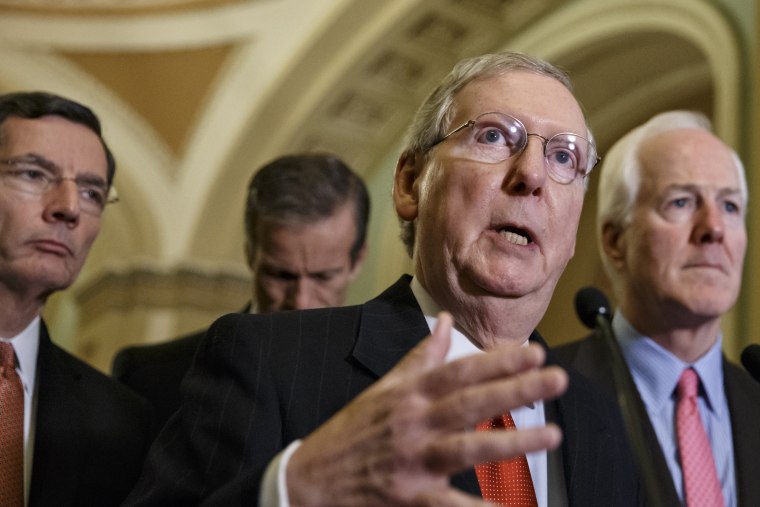Sen. Ron Johnson (R-Wis.) is one of the more vulnerable Republican incumbents in the Senate next year, and some recent polling shows him trailing former Sen. Russ Feingold (D-Wis.), whom he beat in 2010. One of the questions Johnson would prefer not to hear from hundreds of thousands of his constituents for the next year and a half is, "Why did you take my family's health security away?"
The Supreme Court probably won't rule on King v. Burwell until June, and Republican opponents of the Affordable Care Act, at least on the surface, desperately hope they prevail in order to gut much of the nation's health care system. But the hopes come with fear -- if GOP policymakers successfully take coverage from millions, some of those folks might be a little annoyed come Election Day 2016.
It's not complicated: a big win for Republicans at the high court is a big loss for millions of consumers who would quickly lose ACA subsidies they need to afford insurance. This week, however, Ron Johnson and a whole bunch of his friends unveiled an interesting bill.
The legislation, offered by Sen. Ron Johnson (R-WI), one of the most politically vulnerable Senate incumbents in 2016, would maintain the federal HealthCare.gov tax credits at stake in King v. Burwell through the end of August 2017. The bill was unveiled this week with 29 other cosponsors, including Senate Majority Leader Mitch McConnell (R-KY) and his four top deputies, Sen. John Cornyn (R-TX), John Thune (R-SD), John Barrasso (R-WY) and Roy Blunt (R-MO). Another cosponsor is Sen. Roger Wicker (R-MS), the chairman of the conference's electoral arm.
Though the details are a little more complicated than they might appear at first blush, the idea is to effectively lock in the status quo for a couple of years. If Republicans on the Supreme Court agree to take away subsidies for millions, Republicans in Congress now have a message for the affected consumers: everything will stay as-is until August 2017.
As Kaili Joy Gray joked, Senate Republicans have effectively introduced a bill to "protect Obamacare from Senate Republicans."
But whether this is a credible resolution to a self-imposed crisis is something else entirely.
The political motivation is easy to understand, since so many GOP lawmakers don't want to face a voter backlash on such an important issue. Publicly, Republicans thump their chests about Obamacare's unpopular "brand," but privately, those same Republicans know that millions of families who would lose their health security because of a ridiculous GOP lawsuit pose a genuine electoral threat.
The fact that the entire Senate Republican leadership endorsed this proposal tells us something important about the party's actual beliefs about the politics of health care.
The odds of Johnson's bill actually passing, however, are poor. If the Republican justices gut much of the ACA, this two-year solution would kick the can down the road -- and past the 2016 elections -- but as Greg Sargent explained this morning, many right-wing lawmakers don't want that at all. Their goal is to tear down the current system, not keep it going until September 2017 (and quite possibly beyond).
For that matter, Johnson's bill includes some poison-pill provisions that will make Democratic support all but impossible, including the repeal of the individual mandate, which is necessary to control costs and protect consumers with pre-existing conditions. If Republicans were willing to discard the extraneous, counter-productive elements in order to simply help affected consumers, Dems might be willing to go along, but this would only make passage in the more rabid House even less likely.
Far-right lawmakers and activists saw this lawsuit as a godsend: finally, they thought, a way to take a sledgehammer to the Affordable Care Act and strip benefits from millions of families, all without Congress having to do anything at all. The metaphor of the dog that catches the car comes to mind for a reason -- Republicans are just now starting to realize that a "victory" comes at a high cost, and the party isn't close to being prepared.
